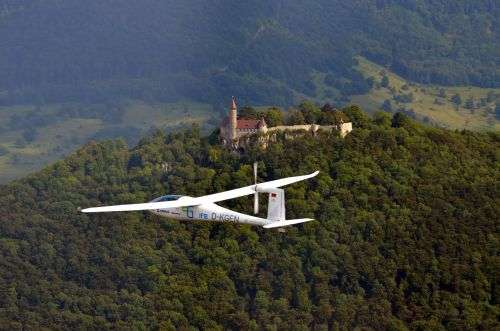Battery-powered aircraft e-Genius on cloud nine

The battery-powered electrical research aircraft e-Genius from the Institute for Aircraft Construction (IFB) at the University of Stuttgart was transported by air from the Kornwestheim/Pattonville airfield on the 560 km route to Straußberg at the beginning of September as a warm up for the Green Speed Cup competition. The e-Genius even set an initial world record on the first transit stop to recharge in Dessau: before this no battery-powered aircraft had ever achieved the feat of travelling a distance of 393 km. On the very first competition day of the Green Speed Cup, the e-Genius had to up its game once more with a daily task of 405 km. Yet the IFB pilots also successfully mastered this range and set the range record for battery-powered aircraft for a second time on 6th September 2013.
In the course of the competition, the conventionally motorised competitors stood no chance against the Stuttgart energy-saving miracle: with the same cruising speed the E-aircraft consumes only a fifth of the energy compared to conventional two-seaters. The e-Genius is still only a two-seater prototype, yet IFB professor Rudolf Voit-Nitschmann is hopeful that the research results in future can also be used for larger aircraft: "We are able to show with the e-Genius that the electrical drive in the aircraft works reliably, with minimum noise and with excellent energy efficiency. This will be significant for future aircraft, e.g. in feeder traffic that is mainly serviced by turboprop aircraft."
The electric aircraft e-Genius was designed and constructed under the leadership of Prof. Rudolf Voit-Nitschmann at the Institute for Aircraft Construction. The successful maiden flight was completed in May 2001. At present the e-Genius is the most efficient battery-powered aircraft worldwide, has a wingspan of 16.85 m, a take-off performance of 65 kW and approx. 900 kg take-off mass. The rechargeable power packs are able to store 56 kWh electrical energy, thereby contributing 300 kg to the take-off mass. The pilots completed the record distance with an average speed of 160 km/h and thereby required an energy equivalent of converted 1 litre for 100 km/h.
Provided by University of Stuttgart





















